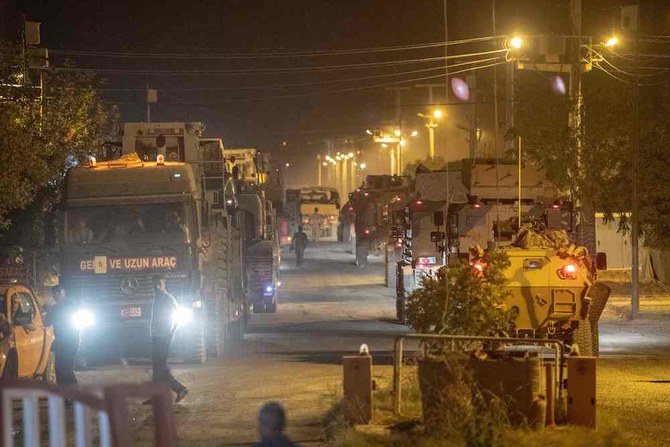AKCAKALE, Turkey: Turkey launched a military operation against Kurdish fighters in northeast Syria on Wednesday just days after US troops pulled back from the area, with warplanes and artillery striking militia positions in several towns in the border region.
Turkish President Tayyip Erdogan, announcing the start of the action, said the aim was to eliminate what he called a “terror corridor” on Turkey’s southern border, but European countries immediately called on Ankara to halt the operation.
Thousands of people fled the Syrian town of Ras Al-Ain toward Hasaka province, held by the Kurdish-led Syrian Democratic Forces. The Turkish air strikes had killed two civilians and wounded two others, the SDF said.
Turkey had been poised to enter northeast Syria since US troops, who have been fighting with Kurdish-led forces against Daesh, started to leave in an abrupt policy shift by US President Donald Trump. The withdrawal was criticized in Washington as a betrayal of America’s Kurdish allies.
A Turkish security source told Reuters the military offensive, dubbed “Operation Peace Spring,” opened with air strikes. Turkish howitzer fire then hit bases and ammunition depots of the Kurdish YPG militia.
The artillery strikes, which also targeted YPG gun and sniper positions, were aimed at sites far from residential areas, the source said.
A Reuters cameraman in the Turkish town of Akcakale saw several explosions across the border in the Syrian town of Tel Abyad, where a witness reported people fleeing en masse.
Large explosions also rocked Ras Al-Ain, just across the border from the Turkish town of Ceylanpinar, a CNN Turk reporter said. The sound of planes could he heard above and smoke was rising from buildings in Ras Al-Ain, he said.
The SDF said military positions and civilians in the city of Qamishli and the town of Ain Issa — more than 30 km (20 miles) inside Syria — had been hit, and said there were initial reports of civilian casualties.
Turkish media said mortar and rocket fire from Syria struck the Turkish border towns of Ceylanpinar and Nusaybin. There were no immediate reports of casualties there.
Turkey’s lira slid 0.5%, breaking through what traders called a key support level of 5.85 against the dollar to its weakest level since August.
World powers fear the action could open a new chapter in Syria’s eight-year-old war and worsen regional turmoil. Ankara has said it intends to create a “safe zone” in order to return millions of refugees to Syrian soil.
In the build-up to the expected offensive, Syria had said it was determined to confront any Turkish aggression by all legitimate means. It was also ready to embrace “prodigal sons,” it said, in an apparent reference to the Syrian Kurdish authorities who hold the northeast.
Turkey views Kurdish YPG fighters in northeast Syria as terrorists because of their ties to militants waging an insurgency inside Turkey. An influx of non-Kurdish Syrians would help it secure a buffer against its main security threat.
Amid deepening humanitarian concerns, Germany said Turkey’s action would lead to further instability and could strengthen Daesh, which the US-armed SDF helped defeat in Syria.
The SDF halted operations against Daesh because of the Turkish offensive, two US officials and a Kurdish source said. One of the officials said US training of stabilization forces in Syria had also been affected.
The United Nations Security Council will meet on Thursday at the request of European countries, who expressed alarm at the offensive, and European Commission President Jean-Claude Juncker said that the bloc would not fund Ankara’s plans in the region.
“If the plan involves the creation of a so-called safe zone, don’t expect the EU to pay for any of it,” he told the EU parliament.
Opinion
This section contains relevant reference points, placed in (Opinion field)
“SHOW RESISTANCE“
Kurdish-led forces have denounced the US policy shift as a “stab in the back.” Trump denied he had abandoned the forces, the most capable US partners in fighting Daesh in Syria.
The Kurdish-led authority in northern Syria declared a state of “general mobilization” before the looming attack.
“We call on all our institutions, and our people in all their components, to head toward the border region with Turkey to fulfil their moral duty and show resistance in these sensitive, historic moments,” it said in a statement.
Erdogan’s communications director Fahrettin Altun said Turkey had no ambition in northeastern Syria except to neutralize the threat against Turkish citizens and to liberate the local people from what he called “the yoke of armed thugs.”
Turkey was taking over leadership of the fight against Daesh in Syria, he said. YPG fighters could either defect or Ankara would have to “stop them from disrupting our counter-Islamic State efforts,” he wrote in a tweet and in a column in the Washington Post, referring to another acronym for Daesh.
Turkey’s Demiroren news agency said Syrian rebels had traveled from northwest Syria to Turkey in preparation for the incursion. They will be based in Ceylanpinar, with 14,000 of them gradually joining the offensive.
“Strike them with an iron fist, make them taste the hell of your fires,” the National Army, the main Turkey-backed rebel force, told its fighters in a statement.
RUSSIA CALLS FOR DIALOGUE
Russia, Syrian President Bashar Assad’s strongest foreign ally, urged dialogue between Damascus and Syria’s Kurds on solving issues in northeast Syria including border security.
“We will do our best to support the start of such substantive talks,” Foreign Minister Sergei Lavrov told reporters during a visit to Kazakhstan.
Another Assad ally, Iran, urged Turkey to show restraint and avoid military action in northern Syria, although it said Turkey was “rightfully worried” about its southern border.
On Monday, Erdogan said US troops started to pull back after a call he had with Trump, adding that talks between Turkish and US officials on the matter would go on.
Trump’s decision to pull back troops has rattled allies, including France and Britain, two of Washington’s main partners in the US-led coalition fighting Daesh.
























